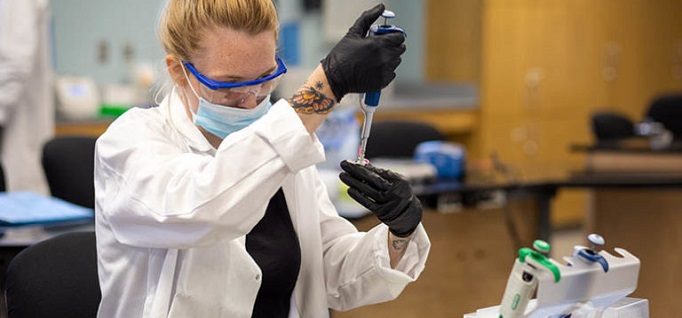Breaking new ground in gene expression research
By Joe Wyatt
August 25, 2021
An undergraduate research experience has led Amarillo College students to new discoveries
Researchers of global climate change have long been aware that an increase in atmospheric CO2 leads to increased crop production, but none have ever understood precisely why.
It is possible that a team of student researchers at Amarillo College (AC) in Texas, having pinpointed gene activation during photosynthesis, can now enlighten them – which they will aim to do when they present their findings on an international stage. The AC team’s gene research has been accepted for competitive presentation at the Undergraduate Research Poster Competition, part of the Crop Science Society of America Annual International meeting November 6-10 in Salt Lake City, Utah.
“This is definitely groundbreaking,” said Jacob Price, assistant professor of biological sciences at AC. “The gene we explored, nobody ever knew what it did or what affects the expression of this gene. Our students effectively found out how to make a plant use light to the best of its ability – to potentially create higher yields.”
Provided an opportunity
Seven students who participated in AC’s STEM research internship last spring semester, using state-of-the-art biotechnology techniques and gene expression, believe they discovered the factor that deactivates a gene which plants use to curtail photosynthesis.
The switching off of photosynthesis – photoprotection, it is called – is a defense mechanism plants naturally employ under stress, and plant yields are nil without photosynthesis.
“Many studies have demonstrated that plants grow better and have a greater yield when exposed to high concentrations of CO2,” Price said, “and students in our STEM research internship have possibly discovered what controls a gene capable of dismantling a plant’s protections through the addition of CO2 using cutting edge biotechnology and gene-expression analysis. We are now capable of turning this gene off, so the plant will not turn off photosynthesis.”
“That they found the gene responsible for turning off photosynthesis is very cool, and so is their inclusion in the highly regarded Undergraduate Research Poster Competition. It’s an amazing opportunity for our students to meet and compete with graduate students from major universities at the highest level.”
AC’s STEM research internship was funded by an HIS-STEM grant from the U.S. Education Department. Price and Clarissa Chairez, director of AC’s STEM Research Center, were the faculty facilitators. Teresa Gaus-Bowling, coordinator of AC’s HSI-STEM Grant, was instrumental as project coordinator. And AC graduate Crystal Moss, a graduate student in biotechnology at West Texas A&M University, served as a volunteer facilitator.
Participating AC students were: Autumn Carroll, Sarinity Frazier and Taylor Gresham – each of whom will represent AC in Salt Lake City – and Luis Ordaz, Kristen Tatro, Kris Tyler and Kenia Villagran – each of whom has since graduated and/or transferred from AC.
“This research was so interesting, and being from a small college like AC and getting to go to Salt Lake City and compete with scholars from big universities is totally unexpected and really kind of surreal,” Autumn Carroll said. “I’d never have imagined such a big result from our research. It’s amazing.
“I’m pretty sure I learned a lot more from the hands-on nature of our research than I would have by sitting in a class and just talking about photosynthesis.”
The nitty-gritty
The gene the AC team focused on is LHCb4.3, part of the LHC gene family. It is responsible for shutting down a plant’s productivity when exposed to the stresses of extreme light. The effort was made possible by the wealth of resources housed in AC’s STEM Research Center, such as real-time PCR (polymerase chain reaction) detection system and a mass spectrometer, which identifies different chemicals and is widely used in forensics, environmental sciences and more.
“It is unheard of for this scale of research to be conducted at the undergraduate level, much less at a community college,” said Crystal Moss of WTAMU. “I feel very fortunate to have been included in this. AC’s lab is every bit as good as any I’ve seen, maybe better. This is Tier I-level biotechnology research, for sure.”
At the Undergraduate Research Poster Competition, Carroll, Frazier and Gresham will present “Examining Plant Photoprotection through Gene Expression.” In conducting their study, they used a model organism, an Arabidopsis, the accepted standard plant for genetic experiments throughout biology. Additionally, they explored methods of extraction of RNA, quantified the expression of this gene through real-time PCR, and learned about experimental design, data analysis and how to present research. A grant from the AC Foundation will fund the trip to Utah.
The three project facilitators – Gaus-Bowling, Moss and Price – will share their experiences with peers in Salt Lake City, too, when they present “Bridging the Equity Gap through Undergraduate Research in Plant Science at Amarillo College.”
This article originally appeared in CC Daily.



